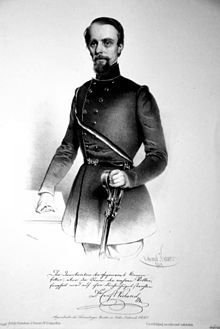Ernst Franz Salvator by Violand

Ernst Franz Salvator von Violand (* 1818 in Wolkersdorf im Weinviertel ; † December 1875 ) was an Austrian revolutionary.
Life
Ernst Franz Salvator's father and grandfather were senior civil servants in the road construction department, and he too was an civil servant in the service of land law. In 1766 his great-grandfather was raised to the rank of Imperial Knight by Emperor Joseph II . Salvator later called for the abolition of all titles of nobility and the privileges associated with them in the Reichstag . After completing his doctorate in law in 1844, he was sent to the Reichstag in 1848 as a member of his constituency of Korneuburg.
“The people are the source and the inalienable seat of all power in the state. Government exists only through the authority of the will of the people ”, according to Violand's political commitment.
revolutionary
In 1848 the revolution came - it had its reasons not only in the political sphere, in the police methods and the suppression of every movement of freedom - the poor economic conditions had at least as revolutionary a effect. Compared to Western Europe, Austria had become a backward country in the 19th century. Unemployment, housing shortages and rising prices characterized the situation of workers and students. Lack of rights in relation to the manorial system and want were the lot of the great majority of the peasants. In these circumstances the situation of the petty bourgeoisie and the craftsmen was also dire.
On March 12, 1848, the students at the University of Vienna held a meeting under the direction of all professors, at which a message to the emperor was resolved, in which freedom of speech and press, a constitution and the installation of a general people's assembly were demanded. On March 13, the representatives of the estates (nobility, church, bourgeoisie) met in the country house in Herrengasse . In the middle of the quiet course of the conference, the rumor spread among the crowd of several thousand people gathered in front of the country house that students had been arrested. As the excited crowd tried to enter the country house, the soldiers who were holding the entrance opened fire. Several people were killed, but the demonstrators could no longer be stopped. On March 13th the March Revolution broke out in Vienna , which forced Metternich's fall .
Violand also went on the barricades of the revolution for his convictions. Fighting broke out again in Vienna on October 6, and the revolution in Austria reached its climax with the October Revolution in Vienna. After the murder of the Minister of War Theodor Graf Baillet von Latour by angry masses on October 6, 1848, the imperial army under Prince Windisch-Grätz cracked down on rebellious Vienna with extreme severity. The hope of the Viennese revolutionaries for relief from the Hungarian revolutionary army was in vain; Vienna was captured by the imperial troops on October 31st.
With the surrender in Hungary and Venice in August and September 1849, the revolution finally ended. Their special characteristic and at the same time the reasons for their failure were the lack of a programmatic concept, a purposeful leadership and personalities who knew how to defend the rights and freedoms they had won. In addition, the bourgeois-liberal circles and the peasants soon distanced themselves from the revolutionary masses in Vienna. The revolution had too many goals and it broke all of Europe. Nonetheless, the revolution paved the way for constitutional change, and after a period of neo-absolutism and two lost wars, the Habsburg monarchy received a constitutional constitution in the 1860s. The most important immediate result of the events of 1848 was the peasant liberation and the dissolution of the feudal structure, which was connected with a modernization of the administrative system.
Violand, like Hans Kudlich and other members of parliament, was announced for arrest by the Vienna Criminal Court in February 1849 and charged with high treason. He came to Hamburg through an adventurous escape via Silesia and Leipzig. In 1850 he wrote down his memoirs, incidentally the only authentic description of the events of 1848 from the perspective of the vanquished. Later, like many other revolutionaries from German-speaking countries, he emigrated to America. There he earned his meager living as a tobacco worker in Virginia. In December 1875 he died of an old lung disease in the state of Illinois . The pioneer for equal rights for all people was soon forgotten.
Exhibition 2005
In 2005, the Weinviertel Academy in the city of Wolkersdorf in the Weinviertel organized an exhibition on Violand, which was ignored by the mayor and his party. It should build bridges from the past to the present of our lives, reflect and evaluate past events and help learn lessons from history so that we do not repeat the mistakes made by generations before us. (Quote TG 12/05)
swell
- MT "Back to the Past" T. Galos 2006
- The social history of the revolution in Austria, E. Violand, Leipzig 1850
literature
Wolfgang Häusler , Ernst Violand (ed.): The social history of the revolution in Austria 1848. Österreichischer Bundesverlag , Vienna 1984, ISBN 3-215-05479-5 .
Web links
- Literature by and about Ernst Franz Salvator von Violand in the catalog of the German National Library
| personal data | |
|---|---|
| SURNAME | Violand, Ernst Franz Salvator from |
| BRIEF DESCRIPTION | Austrian revolutionary |
| DATE OF BIRTH | 1818 |
| PLACE OF BIRTH | Wolkersdorf in the Weinviertel |
| DATE OF DEATH | December 1875 |